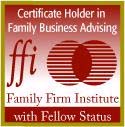|
|
|
|
|
|
|
|
|
|
|
|
|
|
|
|
|
|


by David M. Paradise, Ph.D
.
Ten Most Prevalent Obstacles To Family-Business Succession Planning
1.
Poor Expression of Feelings and Wants
2. Differences are seen as a Liability Rather than an Asset
3. Indirect Communication
4. Entitlement
5. Scarcity - "There isn't enough to go around."
6. Financial Bottom Line
7. Emotional Bottom Line
8. History
9. "Other-Oriented" when it comes to change - blaming others and
expecting them to change.
10. Control
11. Lack of forgiveness
12. Lack of Appreciation, Recognition, and Love
Business succession
Business succession is the transfer of assets, capital, contacts, power, skills, and authority from one generation of ownership to the next. Family business succession has the dual goals of preserving the business and the family. Because of this, every business needs a succession plan. It is the equivalent of a will or an estate plan for the business.
Succession planning in family businesses is complicated and difficult. Often emotions, subjective criteria, and family history factor heavily in the decision making process about who gets what role in the family held firm's succession process. By way of contrast, publicly held companies face fewer emotionally charged issues when it comes to succession planning. By and large, companies with a broad base of owners are mandated to use rational criteria in making business and profit-driven decisions.
Critical to Continuity of the Business
The outcome of the succession process and how it is managed are critical
to the continuity and the economic well being of both the family and its
business.* There are three typical outcomes to the succession process:
In the best of circumstances, a transfer of authority from one person or group to another is accomplished without any tension. Those involved understand and enthusiastically embrace the new power structure.
In another set of conditions, there are disagreements within the family and among key employees or suppliers and advisors surrounding the succession plans, but the disagreements are manageable. Conflict does not evolve into serious, irreversible, unresolvable hostilities.
The third typical outcome to the family business succession process is
where the decision and the interested parties become embroiled in a whole
range of family conflicts. When the assets involved are substantial, these
succession crises make the industry headlines. These disasters make us
cringe, but they are, unfortunately, common. And many of them are predictable
and preventable. The way to prevent conflicts is by developing a workable
succession plan.
Communications is Key
The key to effective succession planning is communication. As in real
estate, value depends on "location, location, location," succession
planning requires "communication, communication, communication."
Whether you are passing the business on or selling, there needs to be
a succession plan.
At times, selling is the best choice. For example, if there is no qualified successor, or if family conflict is too unmanageable. A business owner may say, "My family is more important than the business; if it causes problems between my sons, I'll sell."
Because succession planning in family business is often very difficult emotionally, many families avoid the problem. Often families believe that talking about these problems will lead to conflict that is damaging to the family and the business.
In fact the reverse is true. Since the participants will have emotional reactions, the process must be monitored and addressed in a satisfactory manner so that the conflicts are managed and resolved.
Succession does not just happen. It requires careful planning. Everyone involved needs to become part of the team and plan together so that a succession process develops.
Trust, Respect and Recognition
A central requirement needed for accomplishing the goal of a successful
transition is sufficient trust, respect, and recognition of the needs
for the participants. For example, the older generation needs to trust
that the asset will be preserved. If the older generation is worried that
a lifetime of hard work might be dissipated by the next generation, without
recognition and appreciation for all the prior efforts, there will not
be sufficient trust to proceed to a fruitful conclusion of the plan.
At the same time, the second generation needs to trust that they will have respect, power and decision-making authority. Included here is the need for some new on-the-job training and experience. This usually means that the second generation will not only do some things differently, but will make some mistakes in judgment and execution. If the next generation is worried that it will always be second-guessed and judged imprudent there will not be sufficient trust to proceed to a successful conclusion of the plan.
When the level of trust by either party is insufficient, negative reactions are bound to emerge. Reluctance of the older generation to give up control may be greeted by the second generation with disappointment and suspicion, and cynicism. On the other hand, because the aging process itself entails the loss of power, strength, and authority, the older generation may feel the transition of power is a loss of virility. For its part, the younger generation may feel that there is an emotional resistance to passing the torch to the next generation. The next generation may express its frustration and annoyance with the pace of change, doubting that success in gaining real, meaningful ownership will be achieved.
Financial Considerations
As important as trust is to the succession process, financial well being
is also crucial. Not only does the family business face the challenge
of balancing the needs of the family, but it also has to be sufficiently
profitable to support more people and families during and after the business
transition.
For many family firms, the challenge for the second generation is being able to buy out the first generation. The older generation may view the family business as the vehicle for financing its retirement at the same time that the next generation needs to use the money for its current and future needs. Therefore, not only is adequate liquidity necessary, but the two generations have to agree on the expenditures for that money. Once again, the family business faces the challenge of balancing the needs of the business with the needs of the various constituencies in the family.
To accomplish this balancing act with its business and emotional components
in a timely fashion, all the family business members will need good communication
skills. If some parties express their feelings or wants poorly, the process
will be deprived of meaningful information. Similarly, if the parties
talk privately to the corporate attorney or estate-planning attorney,
without some direct communication among themselves, important differences
may be obscured or seen as obstacles rather than as differences that can
be positively woven into the process and outcome.
Constructive Confrontation
One of the key determinants of a successful outcome is the quality of
family functioning. How strong is the family? How have they solved problems
in the past? Are there ghosts of unresolved conflicts lurking in the shadows?
If old ghosts aren¹t unmasked and buried, they will continue to haunt
the outcome of the succession plan
Put differently, has the family acquired the ability to engage in "friendly confrontation?" Friendly confrontation is putting issues on the table in a friendly way instead of hiding them. This means all parties express feelings, wants, fears and ambivalence clearly and directly.
One issue that often requires friendly confrontation is who should be the successor. To achieve a successful succession, the current ownership needs to address the question: Is there an interested and competent successor?
What if there are several competent successors, how will the successor
be chosen? Who will make the decision? Will there be open discussion about
the skills and other characteristics that are relevant to the choice of
successor? Often birth order, personal temperaments, and perceptions of
who is "special" and so forth, run deeply. The emotions of envy,
jealousy, and other forms of sibling rivalry may be expressed directly
and indirectly.
"Dad Always Liked You Best"
The issues surrounding sibling rivalry are complicated. In most conversations
regarding succession planning, love and competition are apparent to many
outside observers. But inside the family, familiarity with the siblings
and the prior generation may obscure the obvious. In many cases, not every
member of family is liked equally. Moreover, not every member of the family
is equally capable. Therefore, succession based on merit rather than on
fondness for the person may lead to conflict. Then too, potential successors
may want the same role in a business that can only accommodate one person
in a particular role.
When potential successors want their parents¹ approval, and each demands that only one person be chosen for a particular role, everyone will experience stress. The scenario can be further complicated when one sibling has left the business for other pastures only to find at a later date that he/she has a desire to return to the family business. The sibling who has remained faithfully at the family business may feel he/she has greater knowledge of the particular business, especially after putting in "sweat equity," often at a lower compensation rate. The sibling who wants to return may feel he/she has acquired additional skills that will be invaluable for the family business.
Special needs such as verbal, social, mechanical skills (or lack thereof)
may suggest that one or another son or cousin may become the leading candidate
to fill the owner¹s shoes. On the other hand, failings such as addiction
to alcohol, gambling, and/or drug dependency may influence the ultimate
choice of successors.
Daddy's Little Girl?
Gender differences can also complicate the task of choosing a successor,
especially in the family owned and operated auto body business where the
work is physical and dirty and not the traditional place for women. Some
fathers, mothers, and brothers may not want the female member of the family
to become the successor. Some may frame the issue in terms of will men
(employees, customers, owners) respect her?
In 2003, few women choose a career in the family auto body business. However, a recent national family business survey** found,
Women now head approximately ten percent of family businesses-up from five percent five years ago. Female family members are employed full-time at 27 percent of family firms compared with 19 percent five years ago. Asked whether their next CEO might be a woman, 34 percent said yes in 2002, versus 25 percent in 1997.
The Survey goes on to note,
Family business experts have long recognized that daughters enjoy certain advantages over their male siblings or cousins with respect to succession. Generational transitions from fathers to daughters are typically smoother than those involving sons. Women are more sensitive to their father's ego and less likely to engage in conflict or competition.
At the moment, we can only speculate whether women could have a similar set of expectations regarding the family auto body business.
Resolving Conflicts Together
If the ownership generation consists of siblings, how will the brothers
decide whose child becomes the owner and leader in the next generation?
And, as mentioned above with siblings, how do cousins in and out of the
business decide who will take over the ownership and leadership mantles
for the succeeding generation?
For all these and other potential rivalry issues, the ability to discuss differences in a respectful, friendly manner that reinforces relationship will also determine the succession process. This means that the alternative, where the parties blame the other side, expecting the other side to change, only complicates the succession process, since blaming blocks the succession change process.
Only when each party takes responsibility for its own part of the problem and helps solve its own contributions to the impasse, can a difficult condition become a resolvable collaborative opportunity. In the end, the goal is not only to understand the other side¹s position, but also come to a successful resolution that works well enough for the interested parties over the long haul.
In summary, as noted at the beginning of this article, all family businesses need a succession plan. At times, selling is the best choice (for example, if there is no qualified successor, or if family conflict to unmanageable). However, if there is a qualified successor and the differences among those parties are manageable, the communication process will be excellent and the outcome can be very successful and invigorating for family and the business.
______________________________________________________________________________
 David M. Paradise, Ph.D., is founder and president of the Family Business
Resource Center, Newton Centre, MA, a firm that specializes in consultation
that facilitates family and business development. For more information on
the firm go to www.paradisefamilybusiness.com or
contact Dr. Paradise at:
dparadfbrc@aol.com.
David M. Paradise, Ph.D., is founder and president of the Family Business
Resource Center, Newton Centre, MA, a firm that specializes in consultation
that facilitates family and business development. For more information on
the firm go to www.paradisefamilybusiness.com or
contact Dr. Paradise at:
dparadfbrc@aol.com.
*Some of the ideas included herein were initially discussed in an
article written by Michael, J. Sales, Ed.D., in his paper, "The Transfer
of Organizational Power in Family Held Firms," 1989 when he, Deborah
Menashi, MSW, and David M. Paradise, Ph.D., were partners in the Family
Business Resource Center, Newton, MA 02459-1917. This article expands
considerably on some of those earlier ideas.
**The Raymond Institute Survey solicited responses to over 100 questions from 38,000 family businesses. Companies were at least 10 years old, had annual sales of over $1 million and had at least two officers or directors with the same last name. Exactly 1,143 surveys were returned. Mass Mutual Financial Group supported the Survey. Joseph Astrachan, Ph.D., a principal of The Family Business Consulting Group, Inc. and director of The Cox Family Enterprise Center at Kennesaw State University lead the research team that included experts from Loyola University Chicago Family Business Center and Babson College. The survey builds on previously conducted family business surveys from 1993-1995 and in 1997. It can be found at www.raymondinstitute.org/surveyresults.html.
